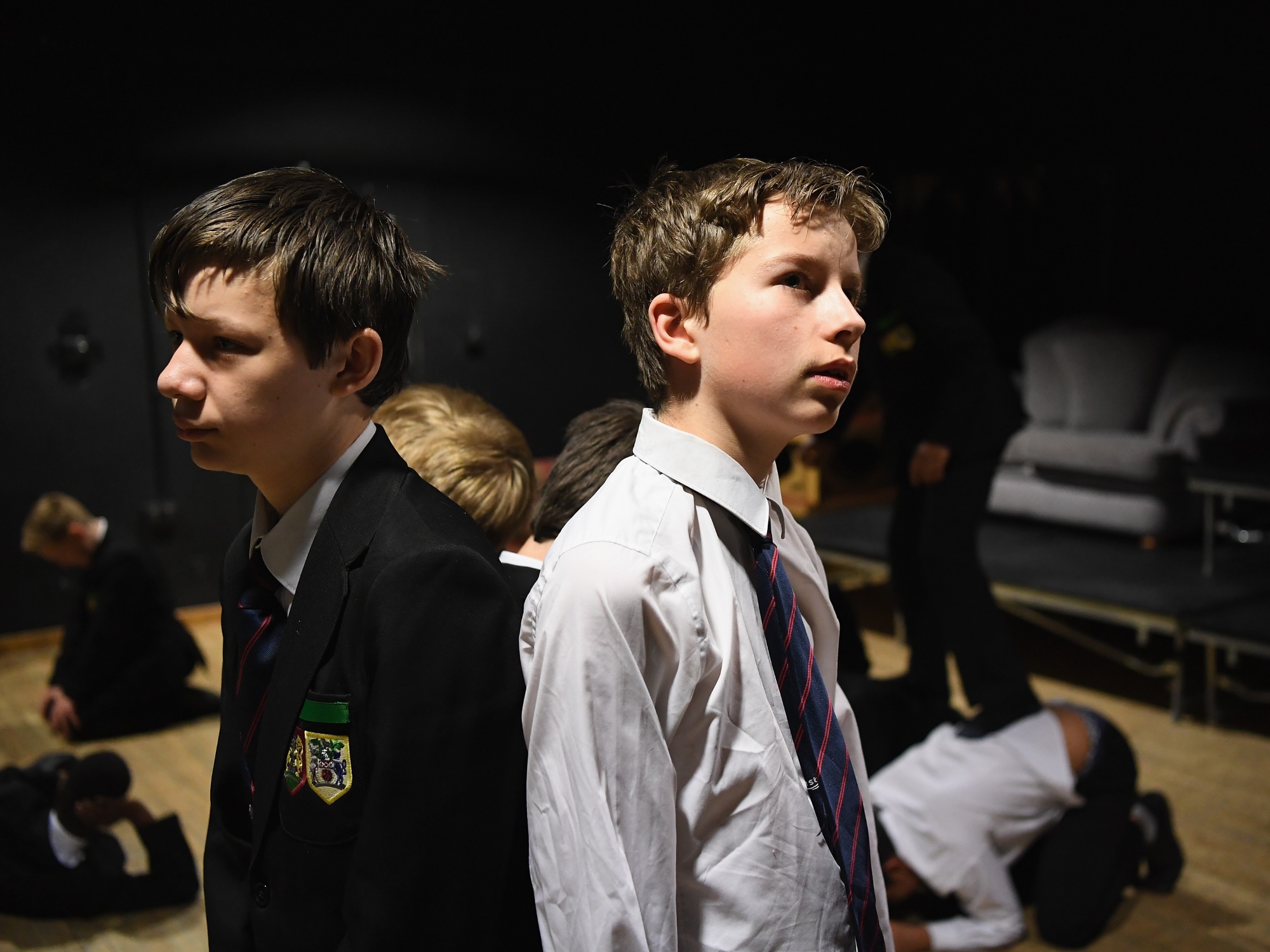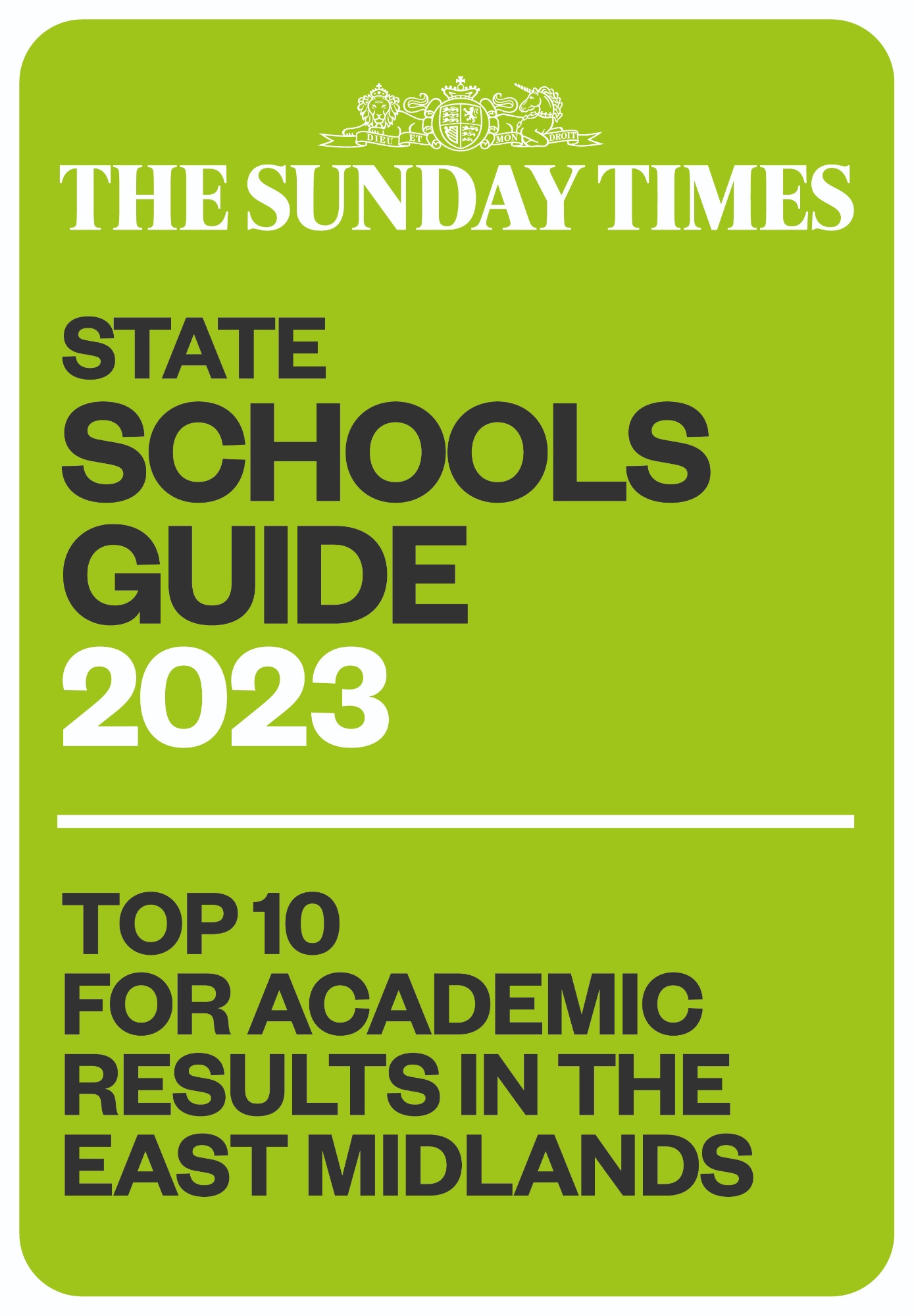Drama
Team Leader - Helen Hasan
Year 7
Term 1: Drama Skills
An introductory scheme that equips the students with the fundamental skills needed to perform, work as a team and respond creatively to a series of short tasks. The scheme instils the importance of a good spatial awareness, making the students aware of stage positioning, vocal projection and movement and using a range of different dramatic stimuli as a starting point. Towards the second half of the term, we introduce spontaneous and rehearsed improvisational tasks to motivate the students to be both creative and professional in how they present their work; physical theatre and loop dialogues also feature in the skills based unit, encouraging the students to apply the techniques they’ve acquired throughout the term to a short script-free performance.
Term 2: Darkwood Manor
Would you stay the night in Darkwood Manor…? This scheme is a firm favourite of the students at Northampton School for Boys, in part because of the storytelling opportunities it presents but also because of how imaginative it encourages the students to be, in fact the development of the scheme is dependent on it.
This unit focuses on the physical actions of the actor and again promotes the importance of teamwork and cooperation. Whilst the emerging story has a simple structure for the students to follow, the outcome of the drama relies on how the students create tension and atmosphere whilst weaving chilling tales and non- naturalistic techniques into every dramatic response. The creative writing task at the end of the scheme allows the students to utilise what they have practically explored into a nail-biting crescendo.
Term 3: Holes by Louis Sacher
Holes is a novel written by Louis Sacher which was adapted into a film by Disney productions in 2003. The novel tells the story of a boy called Stanley Yelnats, who is sent to Camp Green Lake for ‘allegedly’ stealing Clyde Livingston’s shoes. Throughout the scheme, the students will be learning about the social, historical and cultural context of the plot as it visits three different time frames; Latvia in the 1870’s, Green Lake during the 1900’s and finally at Camp Green Lake, present day. The students will explore a variety of skills during the scheme that will enable them to demonstrate their learning through a script- free performance at the end of the unit, utilising the use of props, costume and staging. Amongst other areas, the students will learn about:
- The relationship between performer and audience
- The performers' vocal interpretation of character such as accent, volume, pitch, pace, delivery of lines
- The performers' understanding of character such as build, age, height, facial features, movement, posture, gesture, facial expression.
Over the course of all units the students will learn about specific strategies including:
Role play, Flashback, Thought tracking, Narration, Split screen, Hot seating, Cross- cutting and Writing in role and role on the wall.
Year 8
Term 1 Melodrama: Sweeny Todd
During this scheme, students learn about the early origins of Melodrama, understanding stock characters and signature movements. As the scheme continues, students learn about over- exaggeration in performance, the use of an aside as well as line learning extracts from the play Sweeney Todd to perfect for the Term 1 Assessment. This scheme of work encourages the students to focus on their vocal and physical skills; in particular, over-the-top actions (and reactions) as well as vocal intonation and modulation. The students really enjoy this scheme of work, especially as they begin delving into the characters of Benjamin Barker, Judge Turpin and Johanna. It allows the students to be openly expressive whilst learning some of the history of Victorian theatre.
Term 2 Working from a script: Private Peaceful- Michael Morpurgo
A much-loved classic that presents further opportunity for the students to work from a script. Moving onto to pre- WWI, the students learn about the life of Tommo and Charlie and the trials and tribulations the family face before the brothers were conscripted. This scheme necessarily contrasts from the over- exaggeration of Melodrama. It encourages the students to put themselves into the brother’s shoes and imagine what they would do if they were in a similar situation. The text is explored through ensemble work and group discussion, as the students work towards preparing a second scripted performance to demonstrate their understanding of the skills involved in ensemble work and naturalistic acting.
Term 3 TIE County Lines
This scheme utilises specific SMSC issues surrounding the dangers of drug taking and County Lines. The style of theatre explored is, Theatre-in- Education (TIE) where the students debate a series of poignant issues that many young people are faced with today and utilise their findings into an educational and hard- hitting performance. Many of the techniques taught in this scheme prepare the students for the genres explored in Year 9, including, non- naturalism and scriptwriting. Here the students are encouraged to script their own performance to demonstrate their understanding of both the style and the issues explored. Theatre in Education allows the students to realise that theatre is as much about education as it is about entertainment.
Year 9
Term 1: 13th Amendment- Students will explore the history of the Transatlantic Slave Trade through to the judicial system in America. Throughout the scheme, students will learn about Verbatim Theatre whilst exploring key points in American history, including; The Emancipation Proclamation, The Reconstruction Period, The Jim Crow Laws and The Civil Rights movement. Students will learn how through theatre, you can enlighten and educate your audience, using historical information, new reports, video footage and transcripts.
Term 2: ‘I am sick when I do look on thee’- Throughout this scheme, the students will explore and perform a range of comedy scenes from various plays whilst learning about the skills required to play a convincing role. Ranging from the classics to the contemporaries, the students will learn about the mechanics of engaging an audience and making them laugh. This scheme is designed to encourage physical and vocal growth, including over-exaggerated movements, characterisation and spatial awareness.
Term 3: DNA- Dennis Kelly- This term, the students will be practically exploring the plot of DNA, whilst learning about design elements as well, including set, lighting, costume and sound. As part of their assessment (and in addition to a scripted performance) the students will also complete a written paper, designed to prepare them for the rhetoric of the GCSE paper.
Term 5: ‘Let him have it’- Throughout this scheme, the students will learn about the judicial system in 1950’s and learn about the case of the last man hanged-Derek Bentley. Once again, the students will use interviews, news reports and film extracts to understand why the case was so important in British history and question corporal punishment in the United Kingdom and other countries across the globe.
Term 5: THEATRE PRACTITIONERS/ CONFLICT- During this scheme, the students will explore a range of different historical events whilst learning about key theatrical practitioners including, Brecht and Stanislavski. The students will experiment with different styles and genres whilst creating original theatrical responses. The students will be required to think outside of the box, using different stage configurations, symbolic gestures, colours and props.
Term 6: Consolidation: WRITING A MONOLOGUE- This term, the students will consolidate all previous learning into writing their own original piece of theatre. The students will be expected to show their range of understanding and skill- set, by creating a short script from a stimulus that they will perform at the end of the term. The students will incorporate one or more design elements into their work as well, showing their ability to create and sustain an interesting character in performance who is able to engage an audience.
Year 9 Drama is designed to provide the students with the skills to transition in GCSE with relative ease. Each unit of worked is written to expand the students wider appreciation of theatre whilst developing their own stagecraft as a performer. The students have further opportunity to incorporate a range of design elements into each performance assessment, including costume, lighting, sound and set. Furthermore, the units and topics are chosen to enable further learning of SMSC issues, historical events and public speaking, transferable skills that will benefit our learners irrespective of whether they choose to take Drama into GCSE or A- Level.
KS4 Drama
Over the course of the first year, the students embark upon two shortened versions of the AQA GCSE Drama course in preparation for the second year where each component unit contributes towards the final GCSE grade. In short:
This qualification is linear. Linear means that students undertake all non-exam assessment (NEA) in the certification year and sit the written exam at the end of the course.
Subject Content
The subject content details the knowledge, understanding and skills that students are expected to develop throughout the course of study. The subject content for GCSE Drama is divided into three components:
1. Understanding drama: Written exam: 1 hour and 45 minutes/ Open book- 80 marks and worth 40% of the overall GCSE. The students are assessed on their knowledge and understanding of drama and theatre through the study of one set text from a choice of six; The Crucible, Noughts and Crosses, Hansel and Gretel, The 39 Steps, Blood Brothers and A Midsummer Night’s Dream. In this paper, the students also need to communicate their analysis and evaluation of live theatre makers. The paper is broken down into three sections:
- Section A: multiple choice- where students demonstrate their awareness of theatrical staging, space, roles and responsibilities, how theatre is communicated to an audience (4 marks)
- Section B: four questions on a given extract from the set play chosen (44 marks)
- Section C: one question (from a choice) on the work of theatre makers in a single live theatre production (32 marks)
2. Devising drama: The students are assessed on the process of creating a devised piece of drama, providing a detailed analysis and evaluation of their own work throughout the process. The students produce a devising log (60 marks) to support the performance (20 marks), combined to make a total of 80 marks and worth 40% of the overall GCSE. This component is marked by teachers and moderated by AQA. The students can specialise in a range of areas to include:
- Performer
- Lighting designer
- Sound designer
- Set designer
- Costume designer
- Puppet designer
3. Texts in practice: The students are assessed on the performance of two extracts from the same play (students again may contribute as performer or designer) which must contrast from the set text in Component 1. Each performance extract is awarded up to 20 marks (and worth 40 marks in total) contributing to 20% of the overall GCSE score. This component is marked by AQA.
KS5 Drama
This qualification is linear. Linear means that students undertake all non-exam assessment (NEA) in the certification year and sit the written exam at the end of the course.
Subject Content
There are 3 components;
1. Drama and Theatre: This unit is designed to develop the student’s knowledge and understanding of how drama and theatre is developed and performed, learning how to analyse and evaluate live theatre. This will involve attending the theatre and the study of two set plays, one pre-20th Century and one from the 20th/21st Century. The students will explore context, conventions, form and structure and investigate the theatrical processes and practices involved in interpreting and performing theatre for an audience.
2. Creating Original Drama (devising): This is a practical component where the students will create and develop ideas; communicate meaning as part of the theatre making process, make connections between dramatic theory and practice and apply theatrical skills to realise artistic intentions in live performance.
3. Making theatre (scripted performance): This is a practical component in which the students will apply theatrical skills to realise artistic intentions in live performance and analyse and evaluate their own work.











